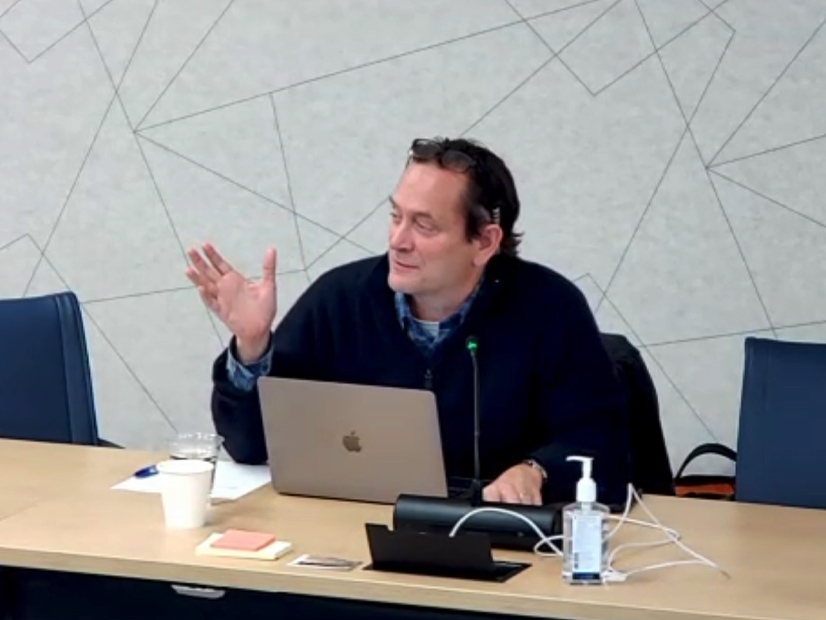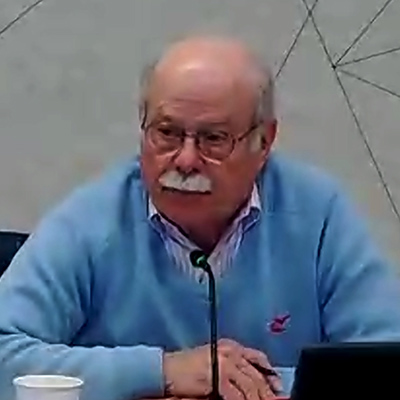If NERC’s latest proposed cold weather standard fails another ballot round, the ERO’s Board of Trustees may have to take matters into its own hands, Chair Ken DeFontes warned at the board’s quarterly meeting.
If NERC’s latest proposed cold weather standard fails another ballot round, the ERO’s Board of Trustees may have to take matters into its own hands, Chair Ken DeFontes warned at the board’s quarterly meeting Dec. 12.
DeFontes reported “with great disappointment” that EOP-012-2 (Extreme cold weather preparedness and operations) received only a 58% segment-weighted vote in favor in the ballot round that closed Nov. 30, short of the two-thirds required for approval.
EOP-012-1 was approved by FERC in February with the stipulation that more work be done. (See FERC Orders New Reliability Standards in Response to Uri.) The commission identified several shortcomings in the standard and ordered NERC to submit a revised version for approval within a year.
Industry stakeholders have rejected EOP-012-2 before; the first time the standard went to a vote in July, it received only a 44% segment-weighted vote in favor. (See Industry Cool on Revised Winter Weather Standard.) But DeFontes warned that the latest rejection meant NERC was in danger of missing FERC’s February deadline.
DeFontes said the board still wishes for the standard to pass through NERC’s normal stakeholder process. To that end, NERC staff attending this week’s meeting of the Standards Committee will request the committee authorize another posting in January with a shortened comment period.
However, if the committee does not approve the posting, or if the standard fails to pass yet again, DeFontes said “the board will have no other choice but to invoke” its authority under section 321 of NERC’s Rules of Procedure to approve a standard without a successful ballot.
In the event that the board determines a ballot pool has failed to approve a proposed standard that addresses a FERC directive, section 321 allows the board to direct the Standards Committee or NERC management to develop a draft standard without stakeholder input. The standard must then be posted for a 45-day public comment period. After the comment period, the board can modify the draft standard in accordance with comments received and file it with FERC, with an explanation for the board’s decision.
“We continue to hope that our stakeholders will rise to the occasion once more and address these important reliability issues promptly, and [that] we will not have to invoke this special rule,” DeFontes said. “However, in the end, NERC must do what it needs to do, and that includes using all of the procedural tools that are available.”
DeFontes added that he would direct staff to “tentatively schedule a special call for the board to invoke the [section 321] rule,” because if the Standards Committee does not authorize the posting or the standard fails to pass the ballot, the board must make its decision “as soon as practicable.”
Trustee Sue Kelly and Vice Chair George Hawkins both expressed support for DeFontes’ position. Kelly said failing to fulfill FERC’s directive is a “situation that I just do not think is tolerable,” while Hawkins assured DeFontes that he had the board’s full support.
“Maybe this goes without saying, but [I want] everyone to understand that this is a unanimous, very powerful statement of all of us. … We are all supportive of you and your statement as board chair,” Hawkins said.
Standards Actions
While EOP-012-2 remains in limbo for now, the board did approve two other standards at the meeting.
CIP-012-2 (Cybersecurity — communications between control centers) was developed under Project 2020-04 following a January 2020 directive from FERC to refine CIP-012-1. The new standard adds requirements for actions to be taken in the event of loss of communications, NERC Vice President of Engineering and Standards Soo Jin Kim told the board.
The board also approved WECC regional standard VAR-501-WECC-4, which governs performance criteria for power system stabilizers in the Western Interconnection. The existing standard mandates that WECC review it at least once every five years to determine if any updates are needed; the regional entity’s Standards Committee developed several minor vocabulary and grammar changes as part of this review.
Trustees then voted to adopt NERC’s 2024-2026 Reliability Standards Development Plan, endorsed by the Standards Committee in October. Kim explained that the RSDP incorporates “certain administrative changes due to [FERC] Order 901,” which directed NERC to develop standards to improve the reliability of inverter-based resources. (See FERC Orders Reliability Rules for Inverter-Based Resources.) The changes were needed to allow “certain high-priority projects to be elevated” to fulfill FERC’s order, Kim said.
Finally, trustees approved NERC’s new working capital and reserves policy. The ERO’s Finance and Audit Committee adopted the policy recently in response to a FERC order in October authorizing NERC to expend unbudgeted funds from its operating reserves up to 5% of its business plan and budget without FERC approval, or to redirect budgeted funds without approval from certain program areas up to the same threshold (FA11-21).
Under the new policy, NERC must submit an informational filing to FERC if the amount drawn from reserves or redirected is between 3 and 5% of its budget; if the amount is less than 3%, no filing is needed.
Reliability Assessment Communication Questioned
A review by NERC staff of the ERO’s recently released Winter Reliability Assessment, and a preview of the upcoming Long-Term Reliability Assessment, prompted trustees to ask whether the organization is doing enough to communicate the grid’s growing risks to policymakers and the public.
Released last month, NERC’s winter assessment warned that much of North America faces elevated or high risk of energy shortfalls during extreme weather conditions, largely because of growing demand, uncertainty around the performance of solar and wind generators, and concerns about the natural gas system’s ability to serve both domestic heating and electric generation needs in extremely low temperatures.
Previewing the LTRA, which is set to be published this week, Mark Olson, NERC’s manager of reliability assessments, said risks to the grid are likely to continue rising over the coming decade. By 2028, he said, most regions of the North American grid will face a risk of energy shortfalls in extreme conditions, with MISO and a significant chunk of SERC Reliability at risk of shortfalls in normal peak conditions.
Following these reviews, Trustee Jane Allen asked NERC CEO Jim Robb if the ERO’s management is “confident that … the messages [in these reports] are getting to the right people.” She suggested that NERC might have more success getting “the attention of the people who need to address this” by being more explicit about the implications of inaction.
Robb told Allen that NERC’s outreach at the moment is focused on “those immediate actions that can alleviate the pressure.” He said a significant challenge in this area is “that the solutions are slow to bring to bear because most of these are structural issues,” and he praised the REs for “doing God’s work” by communicating with state and provincial governments that can help to implement the needed solutions.
Responding to Robb, Kelly returned to Allen’s point, urging management to consider whether other communication strategies could help get the needed information out.
“We say all these things, but we don’t necessarily do what lawyers would call the parade of horribles — [what ensues] if you don’t do something,” Kelly said. “Winter Storm Elliott provides a perfect example, [with] rolling blackouts; Winter Storm Uri, people freeze; these are the consequences of inaction. … If we could, perhaps, just do a little bit on what happens when we don’t do what we need to do … at least in the more popular press or [among] policymakers … it might help get the message out a little bit more.”
Level 3 Alert Results
Darrell Moore, NERC’s director of situational awareness and personnel certification/credential maintenance, provided an overview of results from the ERO’s first-ever Level 3 alert, issued in May to gather information on registered entities’ preparations for extreme cold weather. (See “ERO to Issue First Level 3 Alert May 15,” NERC Board of Trustees/MRC Briefs: May 10-11, 2023.)
Moore said replies to the alert were reassuring for the most part, with “an overwhelming majority” of generator owners reporting that more than 90% of their facilities would be capable of operating at their extreme cold weather temperatures. However, many utilities indicated that freezing conditions “remain a reliability issue for generators,” with concerns about improper heat tracing, frozen instrumentation and control valves, and lack of fuel supply in critical conditions.
Asked by Robb about the usefulness of the Level 3 alert, Moore said the ERO considered the previously unused process a success both in informing utilities of needed cold weather preparations and gathering information on their progress.
“One of the things that this alert has allowed us to do was get a greater understanding of what some of the entities are doing with their essential actions … and it’s allowing us to dig a little deeper … for some of the unfavorable responses that we receive,” Moore said.
NERC Chief Engineer Mark Lauby told trustees that the organization will likely issue another Level 3 alert in the next few months focused on IBRs.





